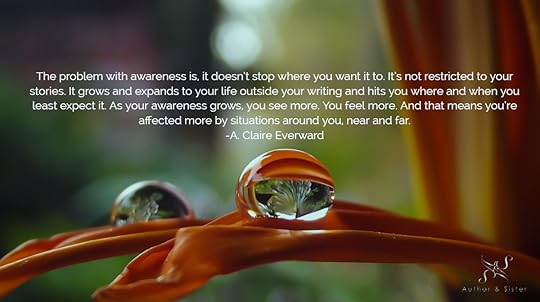Look at what writing is doing to your awareness.

Eighteen weeks after the first day of the second new year
The thing about writing is, it changes you. Author has mentioned that already, hasn’t she? Well, this is another opportunity to do so, to make a related observation. Don’t worry, the change she’s is going to discuss is good. Well, for the most part. And it’s not a change, but more of a development. Awareness, that’s what Author is talking about.
When you write a story you immerse yourself in it. Whatever it’s about, it is a reality you live and breathe for the duration of its writing, from the moment the thought of that story first crosses your mind until the moment it’s done, ready for publication, and you can let it go. And part of that, of living the reality of that story, is living its characters, the people in it. Because when you write, that’s what you do. You build people, people are real in the reality of your story, and real people have real feelings. They go through things, things happen to them and they react, they do things and they react, other characters react to them and they react back. They have conversations that have feelings in them and implement actions that derive from their feelings. Just like people in the real world.
To write feelings in a convincing way, you need to actually experience them. Now think about it: your feelings come naturally to you. Easily. You don’t think about it, you just feel. But when you write characters, when you write the lives of people, you need to actively work to feel the exact feelings they do. You need to take yourself and your own feelings at that moment out of the equation, and actively put yourself in your character’s shoes while that character is going through whatever she or he are going through. You need to feel what that character is feeling, and you need to react like that character does. That means that within the reality you’ve created in your story you need to build an event that will evoke a specific set of feelings in characters whose personalities were created by you.
These events, you’ve probably never been through them, certainly not all of them. Those personalities, they’re probably all, or most, different from yours. Those feelings and emotional reactions, you might have felt them or not, probably not in those contexts and within those personalities. So in order to create all of it—events, characters, and the range of feelings involved, you need to push yourself beyond the boundaries of who you yourself are. You need to be someone else, somewhere else, experiencing something else, something different. And you need to do that for a range of characters, in a range of situations.
Now think what that does to you. It develops your awareness, making it grow. With time, with writing, you will find that you can more easily put yourself in others’ shoes. And by others Author doesn’t mean just the characters in your stories, in the realities depicted in them, but the people in the reality you live in. Maybe you’ve always been able to do that, empathize. And maybe not. Writing will give you that ability if you don’t have it and will improve it if you already do.
That’s a good thing. But there is a downside. You see, the problem with awareness is, it doesn’t stop where you want it to. It’s not restricted to your stories. It grows and expands to your life outside your writing and hits you where and when you least expect it. As your awareness grows, you see more. You feel more. And that means you’re affected more by situations around you, near and far. By what happens to all life around you, near and far. It tends to catch you unprepared, and that’s tough. You’re more exposed, and it’s not always easy—in fact, it’s rarely easy—to contain the amount of feelings you experience. Especially in our era of exposure to so much, too much, all the time.
That’s the observation Author wanted to share with you this week. And how about this for a tip, a suggestion more like it: let your awareness go where it needs to, even if it’s difficult. Because it makes you a better writer, yes, but also because it makes you a better person. True, we writers are not always easy to deal with. And yes, some of this, probably quite a lot of it, is because of how we lose ourselves our inner world, and in often too many feelings, which in turn affects our reactions. But our ability to empathize, to care the way we do, comes from the same place, too. Remember that whatever your personality is, life can build on it in a good way. And being a writer is, in that sense, is a good thing.
Published on May 07, 2018 06:04
•
Tags:
awareness, developing-awareness-as-a-writer, feelings
No comments have been added yet.



